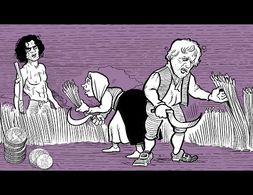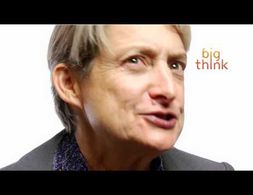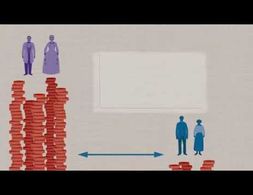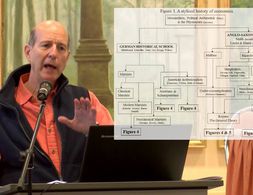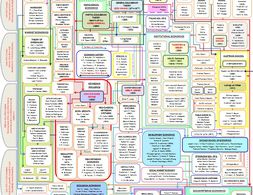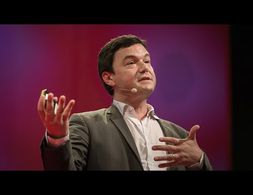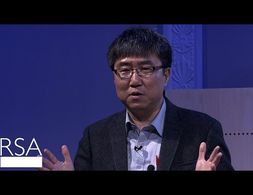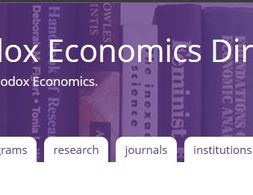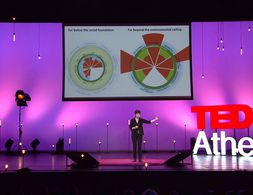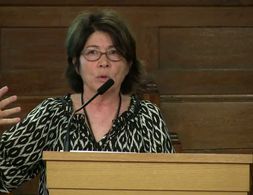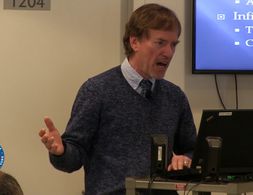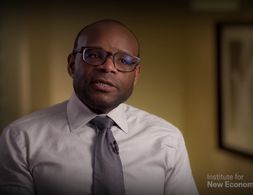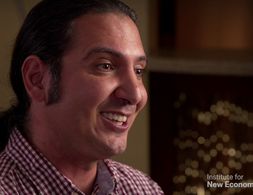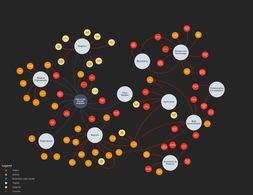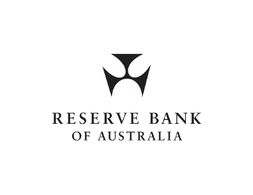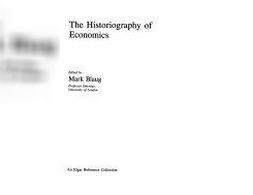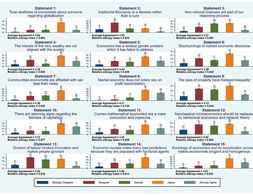1456 Ergebnisse
Adam Smith's concept of the invisible hand and its subsequent perception in economics is illustrated in this short video.
Paul Collier describes the four important topics that he thinks would help the "bottom billion" in the long-run: aid, trade, security and governments. In this short video, Collier explains why he considers government support important.
What does it mean that gender is performative? In this short video, Judith Butler illustrates that gender is a culturally formed norm that is permanently produced and reproduced.
Thomas Piketty's Capital in the 21st century is presented and the central argument that capital returns have historically exceeded growth rates, thus exacerbating inequality is illustrated.
Dirk Bezemer exemplary presents pattern of the U.S. economy before the 2007 economic crisis and explains how due to those pattern the crisis could have been, unless not precisely predicted, yet anticipated.
What does GDP measure? How was it constructed and how did it become so important? What are alternatives? A historical introduction into the critique of GDP as measure of economic welfare.
The text presents a short perspective of International Political Economy, which "have often sought to complement discussions of governance with a healthy dose of critique", on resistance against e.g. economic inequality or economic and political power.
Multimedia dossier on unpaid labor (featuring the UK statistics office unpaid work calculator), migrant care labor and feminist political economy more generally.
Tom Palley provides a very clear and insightful description of the post-Keynesian school of economics by tracing back its connections to the different historical schools of thought.
Economics is dogmatic, monolithic, merely quantitative, highly normative, strongly political, primarily ethical, pseudo-scientific, and manipulative.
In this blog article, Dirk Brockmann illustrates how strong heterogeneities, cluster-like structures and high variability in node connectivities can naturally emerge in growing networks.
Poster of the different schools of thought made by Sergio A. Berumen. From the Greeks to late 20th and beginning of the 21th century.
The economist Thomas Piketty presents a central argument of his book Capital in the Twenty-First century: if the rate of return to capital generally exceeds an economy's growth rate, this leads to a higher concentration of wealth in the long run. He furthermore shows with historical data how wealth and income inequality increased within the past decades.
In this short talk „On Economics“ Ha-Joon Chang, author of the book „Economics: The User's Guide“, gives a critical wrap-up on the economic discipline – on what is perceived as economics, what are dominant paradigms, the role of numbers and economics in public life. He further elaborates on the importance of heterodox schools of thought.
In this lecture Mirowski claims that a good critique of and alternative to neoclassical economics should focus on microeconomics. In addition, he claims that mainstream economics is not about a specific "human nature", instead the understanding of markets (partially based on Hayek) is of special importance. As an alternative Mirowski proposes institutionalist economics that builds upon how markets work nowadays (e.g. links to computer science).
The Heterodox Economics Directory provides a broad variety of links to heterodox journals, books, conferences, study programs, teaching materials and blogs. Some categories are subdivided by schools of thoughts - it's a valuable source for heterodox material on the internet.
How did economic growth become paramount as the public policy objective? Peter Victor discusses the role of growth within institutions, asks if it is possible to imagine a degrowth economy and discusses the role of grass-root movements.
This talk was given at a local TEDx event, produced independently of the TED Conferences. Economic theory is centuries out of date and that's a disaster for ...
At the 2013 Climate, Mind, & Behavior Symposium, Rebecca Adamson of First Peoples Worldwide illustrates alternative economic systems modeled after indigenous worldviews and the power they have in pushing us towards a more sustainable existence.
What is game theory? Game theory is a way of thinking about strategic interactions between people, which makes it a crucial component of economics, political science, international relations, psychology and a variety of other disciplines that deal with the complexities of human interaction in decision making.
As tax day approached, St. Francis College Economics Professors launched their first Economics Week with three days of guest speakers and student research. Randall Wray explains some basic principles of Modern Monetary Theory.
Since Daniel Kahneman won the Nobel Memorial Price in Economic Sciences in 2002, a new branch of economics gained academic and popular interest. That is, the so-called area of behavioural economics. However, some scholars claim that this new area of economics is not changing much of the mainstream paradigm. Why?
In this short talk 'Measuring the Danger of Segregation' Trevon Logan, Professor of Economics at The Ohio State University, explores the impacts of structural racism on economics and health.
Economists claim they are not biased or ideological, but research by economist Mohsen Javdani tells another story. Javdani discovered that 82% of economists claim that statements and arguments should be evaluated on the content only, but the results of the study show the exact opposite.
The resource map contains links to a collection of resources related to the circular economy, which include videos, presentations, graphics, business case studies and articles. Many of the resources were created by the Ellen MacArthur Foundation, others are given credit where due.
In March 2020, the Reserve Bank Board introduced a target for the yield on the three-year Australian Government bond which was discontinued in November 2021. This review examines the experience with the yield target and draws lessons from this experience.
A short course introducing co-operative firms, in the context of the Candian economy where various forms of co-operative make up a significant sector of the economy. The course offers foundational knowledge about co-operatives, explaining what they are and how they operate.
What is James Tobin's main contribution? What is Arrow's impossibility theorem? Which economists have made the most significant contribution to rational expectations? These and countless other questions are resolved in this eloquently written unique book by Mark Blaug, one of the most prominent historians of economic thought.
This volume focuses on the importance of the history of economic thought as an intellectual discipline. It counters the arguments of some contemporary economists who describe it as studying the mistakes of the past. However, all the great economists - Smith, Ricardo, Marx, Marshall, Keynes and even Milton Friedman - have drawn on the history of economics to find an appropriate pedigree for their own theoretical innovations.
Das Lehrbuch "An Introduction to Ecological Economics" von Robert Costanza, John Cumberland, Herman Daly, Robert Goodland and Richard Norgaard ist ein Meilenstein im Hinblick auf eine verständliche Darstellung der Integration von Ökologie und Ökonomie zur neuen Disziplin der Ökologischen Ökonomik.
It is fiercely debated when exactly the growth set off and what the drivers of Indian growth were. Scott Alexander summarises some of the recent literature on this question, demonstrating that not only the liberalisation policies of the 90s might be the driver of the take-off, but potentially public investments, political developments or cultural shifts.
Mohsen Javdani and Ha-Joon Changonline examine the effect of ideological bias among economists through a randomised controlled experiment involving 2,425 economists in 19 countries. The analysis provides clear evidence for the existence of ideological bias as well as of authority bias among economists.
Wir nutzen Cookies. Klicke auf "Akzeptieren" um uns dabei zu helfen, Exploring Economics immer besser zu machen!

